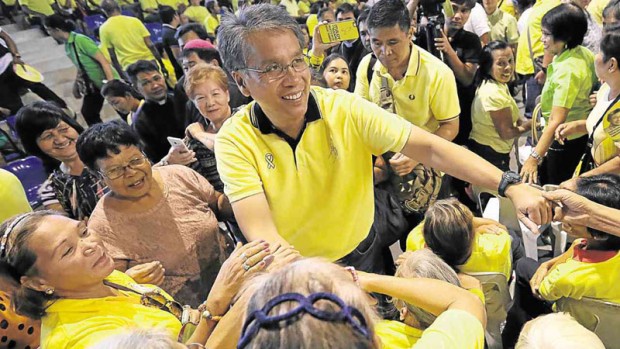DAVAO CITY – Strong leadership is not just about political suaveness but is also about having a strong appreciation of the cultural context of the country, according to the National Ulama Conference of the Philippines.
The group’s statement came on Monday after presidential candidate Mar Roxas uttered the phrase “Muslim na mananakop” or Muslim invaders during the presidential debate in Cebu on Sunday, in referring to the members of the Moro National Liberation Front involved in the hostilities in Zamboanga City in 2013.
Alih Aiyub, secretary general of the NUCP, said cultural fluency would be an essential character and skill each presidential candidate must possess.
READ: Mar Roxas hit for ‘Trumped’ ‘Muslim na mananakop’ remark
“Presidentiables must not only have grasped the issues and concerns and problems besetting our country and presenting concrete viable alternatives and solutions solving them, but also cultural fluency,” Aiyub said.
The NUCP, which closely worked with the communities affected by the violent conflict in Zamboanga City, expressed their concern over the statement of Roxas, adding that it was ironic to hear it from a presidential candidate.
“The statement of Secretary Mar is a clear manifestation of his ignorance and prejudice unbecoming of a would-be president,” Aiyub said.
The armed hostilities, which dragged on for almost three weeks, left 12 civilians killed and more than 100,000 residents displaced.
The country should be headed by a person with a brand of leadership that is culturally sensitive and puts primacy on human dignity and life, according to Aiyub.
“We need leadership that is liberated from racist and bigotry but treat all peoples with respect and dignity,” Aiyub said.
Roxas has been accused in the past of lacking cultural sensitivity most especially in Mindanao. Roxas has denied being bigoted against the Muslims and said statements raised against him have been political intrigues.
In March 2013, the Philippine Daily Inquirer reported that a vessel, which was carrying 523 Filipinos who were fleeing the conflict in Sabah, was forced not to immediately dock in Bongao, Tawi-Tawi and wait for the arrival of Roxas who was the Secretary of the Department of Interior and Local Governments at that time.
The boat stopped in the middle of the sea for four hours so that its docking would be simultaneous with that of Roxas and a group of journalists from Manila. SFM
